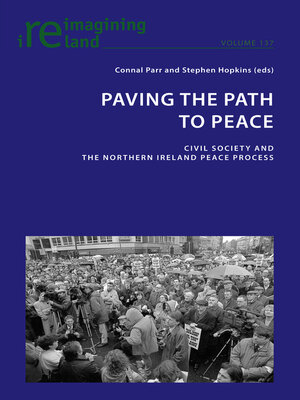Paving the Path to Peace
ebook ∣ Civil Society and the Northern Ireland Peace Process · Reimagining Ireland
By Eamon Maher

Sign up to save your library
With an OverDrive account, you can save your favorite libraries for at-a-glance information about availability. Find out more about OverDrive accounts.
Find this title in Libby, the library reading app by OverDrive.



Search for a digital library with this title
Title found at these libraries:
| Library Name | Distance |
|---|---|
| Loading... |
From the Foreword:
«This important contribution...to the history of this period shines a light on voices often left in the shadows of history's formal and established narrative, voices that reached across divides, laying down the roots of trust and shared humanity that would make the peace process possible. This work serves as both a reminder and a call. It is a reminder of the vital contributions of those civil society organisations who risked and hoped for peace when it was far from certain, and a call to each of us, in Ireland and beyond, to draw from their example as we strive for a world beyond the acceptance of war as anything other than a great human failure, and encourages us to continue to strive for a world where peace, justice, and equality prevail as the natural condition once again.»
(Michael D. Higgins, Uachtarán na hÉireann, President of Ireland)
In the context of the twenty-fifth anniversary of the Good Friday Agreement in April 2023, elite politicians and paramilitary groups were presented as the drivers for conflict and peace in Northern Ireland. This book shifts the focus to the role played by civil society groups which sought to mobilise for peace and reconciliation in the late 1980s and early 1990s. It begins with an analysis of peace activism in Northern Ireland during the earlier decades of violence and is followed by an in-depth case study of the Peace Train Organisation, which was set up to counter paramilitary attacks on the trainline between Dublin and Belfast. The final part assembles contributions from fifteen key protagonists in civil society organisations, reflecting upon their work and lives.
The authors seek to redress the balance in the historiography and popular perception of this critical period, arguing that civil society groups helped shift the social and political climate surrounding the conflict. The book breaks new ground in the memorialisation of the peace process, highlighting the neglected role of transnational civil society peace activism.







